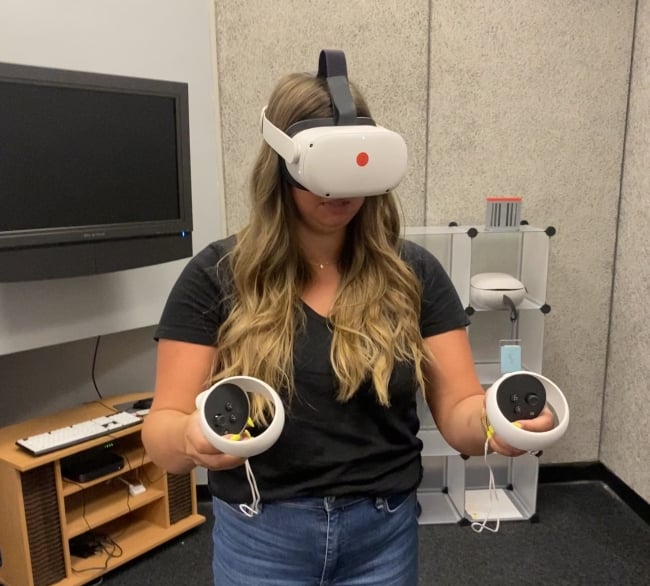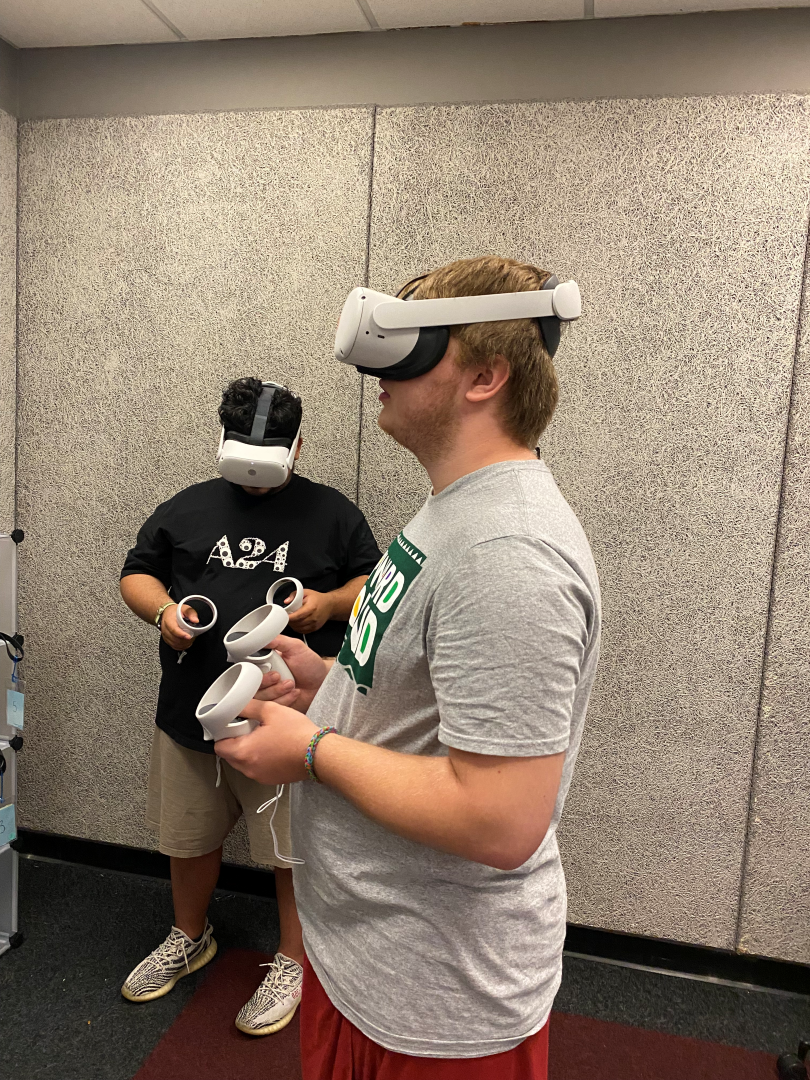You have /5 articles left.
Sign up for a free account or log in.

Students at IUPUI can practice public speaking in front of virtual crowds using VR headsets.
IUPUI
Virtual reality has grown as a classroom engagement and learning tool, connecting students to dinosaurs, creating 360-degree video opportunities and establishing empathy for endangered species.
Now, one university is immersing its students in the spotlight as a public speaker.
Indiana University–Purdue University Indianapolis will launch public speaking training software on campus this fall for students to practice their oratory skills in a simulated environment. Using VR headsets, students will build confidence and gain real-time feedback on their performance to apply off-line.
“Our presentation skills are used almost daily. The more we can enhance those, the better we’re offering opportunities to our students,” says Steve Overbey, director of fundamentals of speech communication and director of the university’s Speaker’s Lab.
The nuts and bolts: Undergraduate students at IUPUI must complete COMM-R 110, a fundamentals of speech communications course, as part of the required course sequence. During the class, students deliver multiple speeches that they’ve researched and written to an audience. The three-credit course has 75 sections this fall, with around 1,800 students enrolled.
Students in the class are encouraged to use the Speaker’s Lab, a free on-campus resource with three soundproof recording and practice rooms, to get help writing, outlining or delivering a speech. And starting this summer, students will have one more resource available to address communication apprehension: a Meta Quest II VR headset.
Initially, the headsets will be advertised to R110 students, with a full campus rollout planned for next spring.
Many students have anxiety around public speaking, Overbey observes, particularly following the COVID-19 pandemic and related stay-at-home orders.
The virtual reality: IUPUI uses software by U.K. developer VirtualSpeech for its speech training. Up until now, VirtualSpeech was primarily marketed toward business audiences who needed to develop their professional speaking, sales or leadership skills. IUPUI is the first institution to use it in a speech lab, Overbey says.
The software was designed to simulate various audience sizes and distractions, to provide users with a safe and effective way to train themselves for real-life speaking scenarios.
To practice, students select the audience size and setting they want to simulate, whether that’s a large auditorium, a classroom or a job interview.
The program gauges a student’s speaking pace, duration, use of filler words, eye contact, viewing direction (whether they’re looking at the whole audience or just one member), tone of voice, spatial positioning and body language using the headset and joysticks. A student can also include an outline or PowerPoint to reference during their simulation.
If a student is faltering in their performance, VR audience characters will respond with boredom: looking away, opening their laptop, texting or putting their head on the table.
After their speech, students receive a report from the program with feedback on the above measures and ways to improve their performance. Students can also use their software license on their personal computers and practice some simulations using their webcam instead of the VR headset.

Students can use the headsets in the Speaker’s Lab or on their own with the library checkout system.
IUPUI
The software is available in 20 different languages, so students who are learning English can receive feedback in their native language if they so choose. Students can also practice speaking in a foreign language.
The next steps: Using grant funding, IUPUI purchased 14 headsets for the Speaker’s Lab, 14 headsets for the library, two headsets for the Idea Garden and 900 licenses to start off.
Headsets in the Speaker’s Lab will remain there for practice, but those in the library can be checked out and taken home for students to use on their own time.
During a VR pilot this past spring, many IUPUI students were skeptical that the experience would feel real but quickly learned there were consequences to giving a monotone speech, Overbey says. “It is very real life, every single person who has tested it—professors, students, high school students—have all felt it's very real and does create some anxiety for them, but not the same as a live audience.”
The goal is to not petrify students about live speaking but give them tools to use out in the real world, speaking better and with more skill, he adds. “It’s not so scary that it gives stage fright, it gives them encouragement for improvement.”
In the future, Overbey sees a wide range of applications on campus, from improving students’ mock interview performance to improving leadership skills.
The Speech Lab will collect pre- and post-surveys from students who use the headsets to gauge impact.
This story was submitted to us by a reader just like you! Share your student success initiatives with us here.




